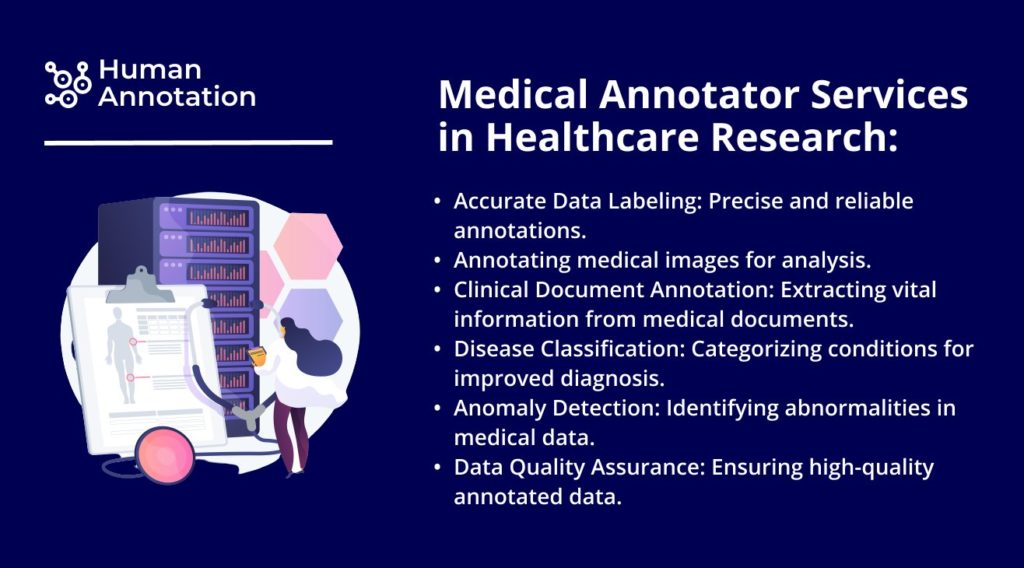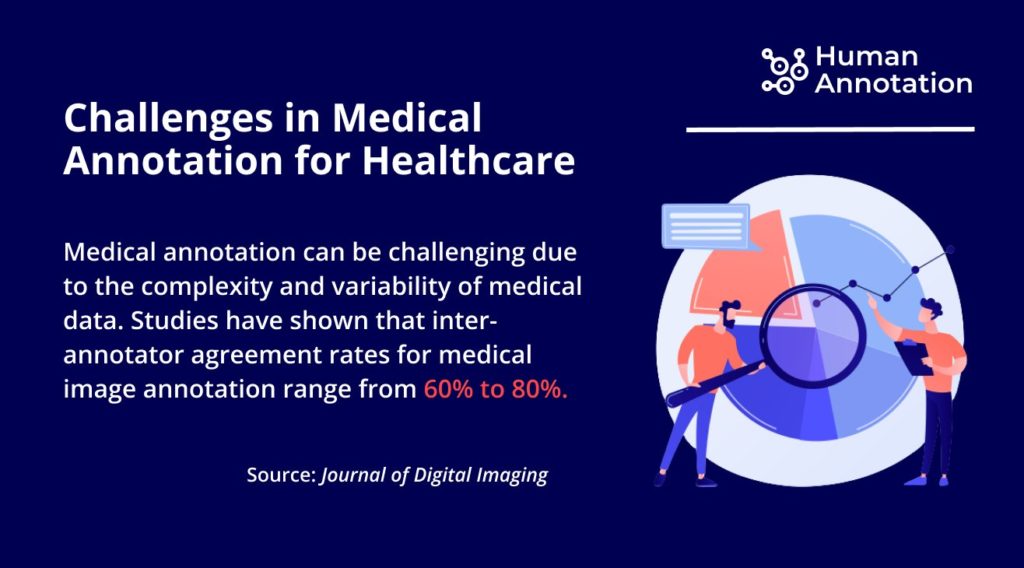
In today’s rapidly advancing healthcare landscape, the potential of machine learning and artificial intelligence (AI) to revolutionize research, diagnostics, and patient care is immense. However, these technologies heavily rely on accurate and comprehensive data labeling and annotation services to deliver meaningful insights and actionable outcomes. This is where medical annotator services play a crucial role.
Medical annotation involves labeling and categorizing diverse types of medical data, including images, text, and clinical records, to enhance their interpretability and usability. Medical image annotation, for example, enables the precise identification and labeling of structures, anomalies, and diseases in medical images, empowering healthcare professionals and researchers with valuable visual insights. Similarly, medical data annotation and labeling services contribute to the development of robust machine learning models by providing accurately labeled datasets.
Medical Annotator Services in Healthcare Research
Medical annotator services play a pivotal role in advancing healthcare research and driving innovation. These services provide accurate and comprehensive annotations that enable the development of intelligent algorithms and machine learning models. Let’s explore the key roles of medical annotator services in healthcare research:

Medical Image Annotation
Medical annotators precisely label and annotate medical images, including X-rays, MRIs, and CT scans. This process helps in identifying and classifying abnormalities, lesions, organs, and other critical structures. Accurate medical image annotator services improves diagnostic accuracy, facilitates treatment planning, and enhances medical imaging research.
Clinical Data Annotation
Medical data annotation involves categorizing and labeling clinical records, including patient demographics, medical histories, diagnoses, and treatments. Annotated clinical data helps researchers extract valuable insights for population studies, disease progression analysis, treatment effectiveness evaluation, and drug discovery.
Healthcare Labeling for Machine Learning
Medical annotator services contribute to training machine learning models in healthcare. Annotated data, such as labeled medical images and clinical data, serve as the foundation for developing predictive analytics, disease classification algorithms, and decision support systems. These models aid in accurate diagnosis, risk assessment, and personalized treatment recommendations.
Healthcare Computer Vision
Medical annotator services support computer vision applications in healthcare. By accurately labeling medical images and videos, annotators enable computer vision algorithms to detect, segment, and analyze anatomical structures, lesions, tumors, and other abnormalities. This technology assists in image-based diagnosis, surgical planning, and image-guided interventions.
Data Quality Assurance
Medical annotator services ensure the accuracy, consistency, and reliability of annotated data. Experienced annotators adhere to rigorous quality assurance protocols, ensuring that the annotations meet the required standards and guidelines. Reliable and high-quality annotations are crucial for robust research outcomes and the development of trustworthy healthcare models.
Data Augmentation
Medical annotator services can also generate augmented datasets by incorporating variations and simulated scenarios. These augmented datasets help in training machine learning models to handle diverse patient populations, uncommon conditions, and rare scenarios, enhancing the generalizability and performance of the algorithms.
The Power of Medical Annotators in Healthcare Machine Learning
Machine learning in healthcare relies heavily on high-quality annotated data. By leveraging medical annotator services, businesses involved in healthcare research and development can unlock the following benefits:
Improved Diagnostics and Patient Care
Accurate medical annotation enables the development of intelligent algorithms that can assist healthcare professionals in diagnosing diseases, identifying patterns, and recommending appropriate treatment plans. With precise medical image labeling, computer vision algorithms can detect abnormalities, aiding in early detection and improving patient outcomes.
Accelerated Research and Development
Medical data annotation expedites the research and development process in healthcare. By accurately labeling clinical records, researchers can extract valuable insights for epidemiological studies, treatment analysis, and drug discovery. This streamlined approach saves time, resources, and effort, driving innovation in healthcare.
Enhanced Predictive Analytics and Proactive Healthcare
AI and machine learning algorithms thrive on accurately annotated data. Through healthcare labeling and annotation, businesses can develop predictive models that help identify at-risk populations, anticipate disease progression, and enable proactive interventions. This data-driven approach empowers healthcare providers to deliver personalized care and interventions, improving patient outcomes.
Contact Our Human Annotation Company for Accurate Data Labeling and Annotation Services
Challenges and Solutions in Medical Annotation for Healthcare Research
Medical annotation plays a critical role in healthcare research by providing labeled data for various applications, including diagnostics, treatment planning, and predictive analytics. However, there are several challenges that researchers and data annotators face when performing medical annotation. Let’s explore some of these challenges and discuss potential solutions:
Complex and Diverse Data: Healthcare data is often complex and diverse, encompassing various modalities such as medical images, clinical records, and genomic data. Annotating these different data types requires expertise and specialized knowledge. Solution: Partnering with an experienced medical annotation service that has domain-specific expertise can ensure accurate and consistent annotations across diverse healthcare data types.
Annotator Subjectivity: Medical annotation can involve subjective interpretations, especially when labeling ambiguous or nuanced cases. Different annotators may provide varying annotations, leading to inconsistency. Solution: Implementing clear annotation guidelines and conducting regular training sessions for annotators can help reduce subjectivity and ensure consistency in the annotation process.
Data Privacy and Security: Healthcare data is highly sensitive and subject to strict privacy regulations. Protecting patient privacy while performing medical annotation is of utmost importance. Solution: Choosing a data annotation service that prioritizes data privacy and security, adheres to privacy regulations, and implements robust data protection measures can safeguard patient information throughout the annotation process.
Limited Annotated Data: Obtaining a sufficient amount of annotated data can be challenging, especially for rare diseases or complex medical conditions. Insufficient data can hinder the development of accurate and robust machine learning models. Solution: Employing data augmentation techniques, such as synthetic data generation or transfer learning from related domains, can help mitigate the challenge of limited annotated data and enable the development of effective healthcare models.
Interoperability and Integration: Integrating annotated data into existing healthcare systems or research workflows can be challenging, particularly when dealing with different data formats and systems. Solution: Ensuring compatibility and interoperability between annotation outputs and existing systems by utilizing standardized formats and APIs can streamline the integration process and facilitate the utilization of annotated data in research and clinical applications.
Continuous Quality Assurance: Maintaining annotation quality throughout the annotation process is crucial. However, ensuring consistency and accuracy can be challenging, particularly when handling large datasets. Solution: Implementing robust quality assurance processes, including regular quality checks, inter-annotator agreement assessments, and feedback loops, can help identify and address any annotation inconsistencies or errors, ensuring high-quality annotated data.

By addressing these challenges and implementing appropriate solutions, researchers and data annotators can overcome hurdles in medical annotation and drive advancements in healthcare research. Collaborating with a reputable medical annotation service provider can streamline the annotation process, enhance data quality, and accelerate research outcomes in the pursuit of improved healthcare solutions.
Choosing Reliable Data Annotation and Labeling Services
To harness the full potential of medical annotator services, it is essential to partner with a trusted data annotation company. Look for a provider that offers the following:
Expertise in Medical Annotation: Ensure that the data annotation company specializes in medical annotation and possesses a deep understanding of the healthcare domain. Their expertise will reflect in the quality and accuracy of the annotations provided.
Accurate and Consistent Annotations: Reliable data labeling and annotation services should deliver precise and consistent annotations, adhering to predefined standards and guidelines. This attention to detail ensures the reliability of the annotated data for downstream machine learning tasks.
Scalability and Flexibility: Choose a data annotation company that can scale their services to handle large volumes of medical data and accommodate evolving project requirements. Flexibility in annotation techniques and the ability to handle various data formats are also essential considerations.
Data Privacy and Security: With healthcare data being highly sensitive, it is crucial to prioritize data privacy and security. Ensure that the data annotation company has robust measures in place to protect the confidentiality of your data throughout the annotation process.
Are you ready to unlock the transformative power of medical annotator services? Contact our Human Annotation company today for reliable data labeling and annotation services in the healthcare domain. Our team of skilled annotators possesses the expertise and experience to deliver accurate and consistent annotations, enabling you to leverage the potential of machine learning.


